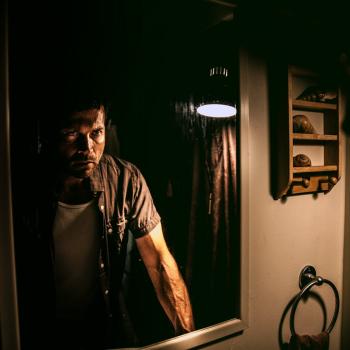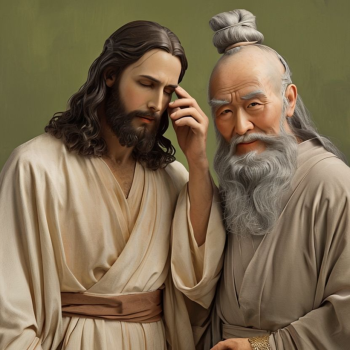As a single leaf turns not yellow but with the silent knowledge of the whole tree, so the wrong-doer cannot do wrong without the hidden will of you all. ~ Khalil Gibran, The Prophet
My little girl is afraid of thunder, and storms come often to Georgia in the spring months. When thunder crackles and booms over the house at night, I walk into her room and invariably find her awake and hiding underneath her blanket. She asks me to lie down, so I stretch out beside her and she pulls my arm across her like a safety belt. I tell that we—sheltered, hidden, warmly enfolded—are like the little boy growing even now in her mother's womb. She smiles, tucks her head into my chest, and drifts back to sleep.
Last week, the last time I found myself laying beside my daughter in a thunderstorm, the weight in my heart was nearly unbearable. For two weeks, I've been trying to begin a series on the issue of abortion. I wanted to see it with fresh eyes, to think it through again from the beginning.
This has involved reading the stories of women who have had abortions, whether they defend or regret their decision. It's involved reading impassioned arguments from doctors who refuse to perform abortions, and from others who believe that access to safe and legal abortions saves the lives of women who will seek abortions whatever their legal status.
It's also involved reading the Grand Jury Report on Kermit Gosnell's horrific abortion mill, and staring for hours at wrenching pictures of fetuses dismembered in the womb and clawed from their mothers' bodies. Wherever one stands on the moral and social questions, I am convinced, one owes it to all of those whose lives are affected by abortion to witness the whole of the issue and not cover over the parts one does not want to see.
As I look at those photos—I invite you to look at just two, here and here—the words of Khalil Gibran will not leave me alone. The combined weight of those images and those words is crushing. Of all the lovely words in The Prophet, those words especially have stayed with me, since they remind me to look first to myself and to the thousands of subtle ways in which I contribute, and passively permit, social sin and criminality.
In the last analysis, setting aside the many and complex questions that attend the abortion debate (and I will address those in later parts of this series), the essence of the matter is this: I believe the life of a child enfolded in her mother's flesh is no less sacred than the life of my daughter hidden beneath the blanket. My moral obligations to them are not identical, because I have special responsibilities to my own children. However, in their humanity and sacred worth, the only difference between my daughter and those fetuses in the moments before they were mutilated is three years and a decision to let live.
I truly wish I could believe that the human fetus is morally insignificant, no more sacred or valuable than a tumor and thus no worse to remove from a woman's body. Or I wish I could believe that it bore some moral value, perhaps, but not an absolute value, or not enough to outweigh consideration of the mother's needs. I'm not eager to conclude that, in the midst of our extended national sickness, tens of millions of little ones—living human persons in every morally significant sense—have been put to death in this country under protection of law. I'm not eager to conclude that tens of millions of women have taken those lives, and tens of millions of men have encouraged, pressured, and forced them to do so. And selfishly, I'm not eager to conclude that I have done next-to-nothing to prevent all of this.
Yet I do conclude those things because I do not believe the unborn child is of lesser moral worth than the born child. This is written not with a sense of self-righteousness but with a sense of grief. How could we have done this? When did we so profoundly lose our way that we were willing, legally and politically, to sanction the theft of so many millions of innocent lives? And what have I done to protect them?
After Jared Lee Loughner attacked congresswoman Gabrielle Giffords and killed six others, many in the national media rushed to condemn the "climate of hate" permeating the Right that had, they assumed, surely influenced the gunman. While they were wrong about the specifics—Loughner was apparently uninfluenced by extreme voices on the Right—they were not wrong that the collective words and deeds of a society can create the contexts in which the specific actions of specific people arise and make sense.





